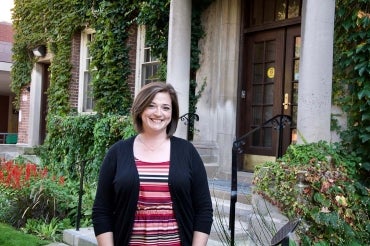Rising star: Social psychologist's interest in teaching extends to researching what works – or doesn't – in the classroom

Published: October 20, 2017
Molly Metz has had a life-long passion for teaching, as well as a more recent focus on pedagogical research.
As a social psychologist, she is interested in the kind of classroom environments that help create good discussions about sensitive topics such as sexuality and prejudice, which are subjects that are addressed in some of her courses.
Metz, an assistant professor, teaching-stream in the department of psychology at the University of Toronto, is currently studying “trigger warnings” – the practice of giving students advance notice about difficult material in a class.
Proponents of trigger warnings say they help students engage in challenging conversations. Opponents argue students may take advantage of such warnings to avoid difficult information.
There are plenty of opinions both for and against trigger warnings, but not enough solid data or information on either side of the argument, says Metz.
“It’s not easy to facilitate these conversations while also respecting the backgrounds and lived experiences of students," she says. "Struggling with difficult material is often where learning begins.”
Her own teaching philosophy is grounded in self-determination theory, the idea that people do best when their basic needs for relatedness, competence, and autonomy are met (i.e., when they feel effective, productive and in control of their own success).
“I don’t want students to feel I am the keeper of the information. I want to help them find out things on their own,” says Metz, who will be teaching a statistics class as well social psychology classes.
As much as she loves teaching, Metz is equally passionate about her research. It's one of the reasosn why when she saw the posting for U of T, she felt she'd found her dream job.
“At U of T, I get to focus on my passion for undergraduate teaching and mentoring, while still working in a culture of top-tier research – this is all the stuff I love,” says Metz, who joined the Faculty of Arts & Science this year. Previously she taught at Miami University in her home state of Ohio.
“I’m very impressed that U of T believes you need to value both teaching and research to complete the mission of the university.”
Her foundational work has focused on the types of emotional support couples give each other, especially the features of “caregivers” in a relationship. The work can be painstaking – one of her studies in graduate school involved 80 couples and took three years and the help of 20 research assistants to complete.
While the data is still being analyzed, Metz said preliminary results show some interesting findings. For example, they measured cardiovascular stress levels in the partner who was watching their loved one being tested, so were able to demonstrate for the first time that the observer experienced sympathetic or “vicarious” physiological reactions as their partner engaged in difficult tasks, like giving a speech.
As a complement to her more detailed and lengthy couples’ research, Metz also has become interested in “face perception” studies and the qualities we associate with people based on their appearance.
In one study, Metz showed her subjects pictures of strangers and found that the people they perceived as having kind and “caring” faces were deemed more desirable partners for long-term relationships.
“It’s all about what we can learn from minimal information. From an evolutionary perspective, it would make sense if we could identify people who are going to be quality caregivers before we invest too much in that relationship,” says Metz.
“The next question I have not had a chance to explore yet is whether we are accurate or not in those judgments and perceptions.”



